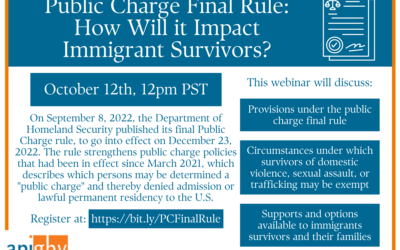This Advisory answers common questions about providing shelter and other program services to undocumented victims, describes the law and federal policy (as of the Advisory’s publication date), and proposes best practices for programs, but it is not legal advice. Immigration and criminal laws vary from region to region, and federal immigration enforcement policies are constantly changing. Programs should analyze their program-specific risks, their community’s particular needs, and the laws in their jurisdiction—including legal duties associated with an agency’s funding sources—as they design or update program policies. Consulting a local immigration attorney with criminal law experience is highly advisable.
Related Resources
Safeguard Asylum for Survivors – Tell Your Senator to Reject the Emergency National Security Supplemental Appropriations
February 5, 2024 On Sunday night, Senate negotiators released the text of the “Emergency National Security Supplemental Appropriations Act, 2024,” legislation intended to address defense funding and border security concerns. Unfortunately, this funding bill includes...
How Do Recent ‘Public Charge’ Policy Changes Impact Immigrant Survivors of Crime?
The Department of Homeland Security (DHS) is proposing a new rule that put longstanding policy about the meaning and application of the “public charge” provisions of immigration law into regulation form. This advisory describes provisions under this new proposed rule and how it will impact immigrant survivors of violence, particularly in light of the pandemic.
Public Charge Final Rule: How Will It Impact Immigrant Survivors?
10/12/22 at 12:00 - 1:00pm PSTOn September 8, 2022, the Department of Homeland Security (DHS) published its final Public Charge rule, to go into effect on December 23, 2022. The rule strengthens public charge policies that had been in effect since March 2021, which...
API-GBV Welcomes Protections For Immigrant Survivors Under the Final Public Charge Rule
September 8, 2022 This morning, the U.S. Department of Homeland Security (DHS) published its final Public Charge rule. The final rule will be published in the Federal Register for public inspection tomorrow, September 9th and will go into effect December 23rd....
Advisory: How Do Recent HUD Proposed Rules About Verification of Immigration Status Impact Survivors of Domestic & Sexual Assault?
The Department of Housing and Urban Development (HUD) proposed regulations that change longstanding policy relating to immigration status verification requirements and disallowing those ineligible for federal housing assistance (i.e., members of “mixed-status” households) from residing in HUD’s public and specified assisted housing programs. This advisory describes impacts of the proposed rule on immigrant survivors of violence
May 2019 Advocate & Legal Services Findings: Immigrant Survivors Fear Reporting Violence
In May 2019, a coalition of national organizations gathered feedback from nearly six hundred advocates and attorneys from across the United States, learning that many immigrant victims of domestic and sexual violence are now too afraid to call the police or go to court to get help. The advocates report that survivors have an increased fear of deportation, retaliation by their abusers, and separation from their children.


